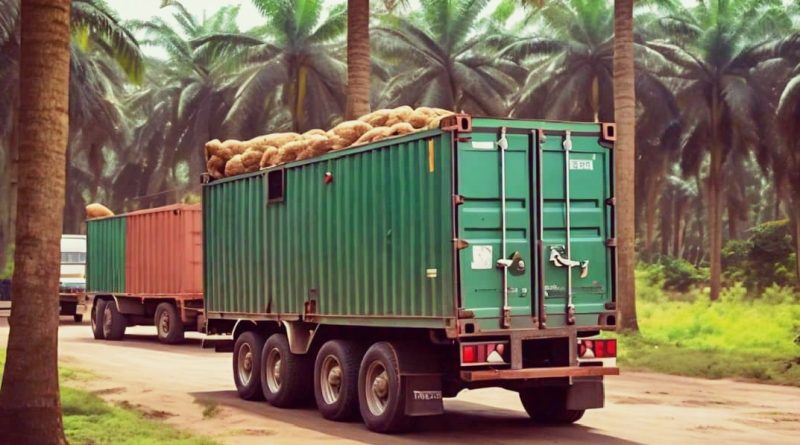Unlocking Nigeria’s Agro-Export Potential: Balancing Export Growth with Food Security
Perspectives with Dr. Iyke Ezeugo
Nigeria is at a pivotal moment in its economic evolution, facing the potential to harness its vast agricultural resources for non-oil export promotion. The nation, rich in arable land and agricultural diversity, is positioned to transform its economy by scaling up agricultural production, boosting exports, and reducing dependence on oil. However, this opportunity must be balanced against the equally critical goal of food security for Nigeria’s over 200 million citizens.
The recent NEXHUB Export Conference, organized by Zeenab Foods Limited, emphasized that unlocking Nigeria’s non-oil export potential requires a multi-faceted approach combining neighborhood security, infrastructure development, farmer empowerment, and robust policy frameworks. For those interested in getting a share of the export cake, Zeenab Foods Limited, through NEXHUB, has led non-oil export promotion and provided practical solutions for exporters in China and the Far East.
NEXHUB, commissioned by the government to operate the Nigerian Trade House in China, is revolutionizing agri-based non-oil exports, making it easy for anyone to export and earn foreign currency, regardless of prior experience. This article dives deeper into the strategies of boosting exports, and reducing dependence on oil, employing some practical lessons and global case studies to enrich the conversation.
Nigeria’s Export Landscape: A Wealth of Untapped Potential
Historically, Nigeria was an agrarian powerhouse, feeding much of West Africa and ranking among the world’s top exporters of crops like cocoa, palm oil, and groundnuts. However, the discovery of oil in the 1950s shifted the nation’s focus, leading to decades of neglect for its agricultural sector. As philosopher George Santayana warned, “Those who cannot remember the past are condemned to repeat it.” Nigeria’s economic overreliance on oil echoes past mistakes made by other countries that neglected to diversify their economies.
The question Nigeria faces today is whether it will follow the path of failed monocultures or embrace the agricultural diversity that once sustained its economy. The non-oil export landscape in Nigeria can be divided into two sectors: solid minerals and agricultural products.
Solid Minerals Sector
Nigeria’s wealth of minerals, including gold, tin, limestone, and coal, presents significant export opportunities. However, this sector faces challenges such as illegal mining, poor regulatory frameworks, and underinvestment. Countries like Chile offer valuable lessons in mineral sector management. Chile has successfully leveraged its copper reserves to become a global economic leader, implementing stringent regulations, transparency, and long-term investments in mining technology. Nigeria must adopt a similar approach, focusing on sustainable extraction and reinvesting in communities affected by mining activities.
Agricultural Products
Agriculture remains Nigeria’s most promising sector for non-oil exports. Nigeria’s over 84 million hectares of arable land place it among the top agricultural producers in Africa. Yet, only a fraction of this land is being cultivated effectively. With high yields in crops such as cassava, yams, maize, and rice, Nigeria has the potential to become a major player in global agricultural markets. Countries like Brazil and Vietnam, both of which transformed their agricultural sectors to become global export leaders, serve as models for Nigeria.
Brazil’s agricultural revolution, driven by a focus on infrastructure, research, and innovation, turned it into one of the world’s top exporters of soybeans, coffee, and beef. Vietnam, once dependent on rice imports, is now a leading exporter of rice and coffee, thanks to land reforms, farmer capacity building, and targeted investments. Nigeria must learn from these success stories to unlock its own potential.
Key Strategies for Maximizing Agro-Export Potential
To capitalize on its agricultural opportunities while safeguarding national food security, Nigeria must focus on several critical strategies.
1. Safe and Secure Farming Environment
Philosopher Thomas Hobbes once described life in a state of nature as “nasty, brutish, and short.” The same could be said of farming in regions plagued by banditry, communal conflicts, and insurgency. A secure farming environment is paramount for agricultural productivity. Farmers in northern Nigeria, Middle belt and some parts of the Eastern regions, face constant threats that hinder their ability to grow crops. Nigeria must reengineer its security architecture, involving local communities in policing and offering incentives for protecting farmlands. Free-range grazing of animals: cows grazing on people’s farms must stop too!
By empowering local populations and reinforcing national security, Nigeria can ensure a safe environment for farming, boosting agricultural output and enhancing food security.
2. Infrastructure Development
As the Roman Empire expanded its borders, it built roads, aqueducts, and granaries, laying the groundwork for sustained agricultural production and trade across Europe and North Africa. Similarly, Nigeria’s agricultural success depends on robust infrastructure—irrigation systems, farm-to-market roads, storage facilities, and reliable energy supply. Countries like Israel, with limited water resources, have become agricultural powerhouses by investing in cutting-edge irrigation technology. Nigeria must follow suit, ensuring that farmers can cultivate crops year-round and transport their produce efficiently to domestic and international markets.
3. Input Supply and Accessibility
One of the lessons from India’s Green Revolution in the 1960s was the importance of access to quality seeds, fertilizers, and modern farming equipment. India’s transformation from a food-deficient nation to one of the world’s top agricultural producers was driven by government initiatives to provide farmers with essential inputs.
Community associations are driving change, achieving impressive results without government intervention. The Isuikwuato Consultative Forum (ICF) stands out with its pioneering Isuikwuato Agriculture Revolution Programme (ISAREP) in Abia State. ISAREP’s innovative approach – providing training, technical support, and high-yielding agricultural inputs at no cost – has significantly improved cultivation in the community through empowerment and enlightenment. Its remarkable achievements make ISAREP a model worthy of replication.
Nigeria can replicate this success by ensuring that farmers have access to high-quality seeds, fertilizers, and affordable mechanization options, such as tractor hire services.
4. Farmer Capacity Building and Research
As noted by agronomist Norman Borlaug, “You can’t build a peaceful world on empty stomachs and human misery.” Farmer education and capacity building are essential for sustainable agricultural growth. Through training and extension services, Nigerian farmers can learn modern techniques, improve crop yields, and meet global export standards. Digital agriculture initiatives, such as mobile apps for market information and agronomic advice, can also empower farmers by giving them real-time data on weather conditions, pest outbreaks, and market prices.
Additionally, investment in research and development is critical. Nigeria must fund research institutions to develop high-yield, disease-resistant crop varieties tailored to its diverse climatic conditions. The success of the International Institute of Tropical Agriculture (IITA) in developing improved cassava varieties serves as a model for the importance of research in agricultural transformation.
5. Market Access and Price Stability
Connecting farmers to local and international markets is vital for maximizing export potential. *Institutions like NEXHUB are already playing key role in establishing market linkages, stabilizing prices, and promoting export-oriented farming. Moreover, conducting market research to understand global demand trends will help Nigerian farmers compete on the international stage, particularly the China and the Asian Markets
6. Policy and Regulatory Framework
A sound agricultural policy framework is essential for success. Revisiting outdated regulations, such as Nigeria’s Land Use Act, can simplify land acquisition processes and encourage investment in agriculture. Countries like Rwanda have implemented successful land reforms, leading to increased agricultural productivity and economic growth. Nigeria must adopt similar measures to streamline land ownership and access for farmers.
7. Climate-Smart Agriculture
In the face of climate change, Nigeria must adopt sustainable farming practices to ensure long-term agricultural viability. Climate-smart agriculture, which focuses on resilience and adaptability, is being implemented in countries like Kenya, where farmers are adopting drought-resistant crops and conservation techniques to combat changing weather patterns. Nigeria must invest in research and technologies that mitigate the effects of climate change on its agricultural sector.
Global Case Studies: Maximizing Agro-Export Opportunities
Several countries have successfully leveraged their agricultural potential to boost exports while ensuring food security. For instance:
– Brazil: Through heavy investment in agricultural research and infrastructure, Brazil became the world’s leading exporter of soybeans, beef, and poultry. Its Embrapa research institution played a pivotal role in developing high-yield crop varieties suited to Brazil’s tropical climate, demonstrating the importance of research in agricultural transformation.
– Vietnam: Vietnam’s agricultural success story is built on land reforms, farmer education, and export-oriented policies. Once a food-importing nation, Vietnam is now one of the top exporters of rice, coffee, and cashews, with smallholder farmers benefiting from improved access to markets and government support.
– The Netherlands: Despite its small size, the Netherlands is the second-largest exporter of agricultural products globally, thanks to a focus on high-tech farming, innovation, and sustainable practices. Dutch farmers use precision agriculture techniques and greenhouses to produce high yields with minimal environmental impact, making the country a leader in agricultural sustainability.
A Path Forward for Nigeria’s Agro-Export Sector
Unlocking Nigeria’s agro-export potential requires a holistic approach that balances export growth with food security. By investing in infrastructure, securing farming environments, ensuring access to inputs, building farmer capacities, and reforming policies, Nigeria can transform its agricultural sector into a robust engine for economic growth. Moreover, the adoption of climate-smart practices and innovative technologies will ensure long-term sustainability.
As philosopher Lao Tzu wisely observed, “The journey of a thousand miles begins with a single step.” Nigeria has the potential to become a global agricultural leader, but it must take the necessary steps today. By learning from countries like Brazil, Vietnam, and the Netherlands, and by borrowing the ISAREP template, Nigeria can harness its agricultural wealth, boost exports, and ensure food security for future generations. The time to act is now, and with strategic planning, Nigeria’s agricultural future is ripe for success.
Dr. Iyke Ezeugo is a Forensic Researcher, a Social Impact Expert, and Satirist who uses his perspectives and parodies to challenge the status quo, spark debates, and inspire fresh perspectives on public affairs through insightful intellectual injections.




